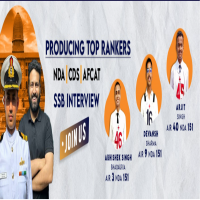Most Common SSB Questions Every Aspirant Should Know

The Services Selection Board (SSB) interview is the ultimate test of character, personality, and aptitude for individuals aspiring to join the Indian Armed Forces. It’s not just a test of academics or general knowledge; it’s a deep psychological assessment that evaluates your suitability as a future officer. To help you prepare effectively, we’ve compiled a list of the most common SSB questions every aspirant should know, focusing on the best SSB questions for interview that often make or break your chances of recommendation. Let’s dive in and understand the nature of these questions and how you can answer them with confidence and clarity.
What Makes an SSB Interview Different?
Unlike standard interviews, the SSB interview focuses more on your behavior, thought process, and potential to lead under pressure. Conducted over five days, it includes psychological tests, group discussions, physical tasks, and a personal interview that is crucial in evaluating your Officer-Like Qualities (OLQs).
The best SSB questions for interview are designed not to test your memory or theoretical knowledge, but to gauge your:
Emotional resilience
Leadership ability
Decision-making skills
Honesty and integrity
Adaptability and social awareness
Most Common SSB Interview Questions (With Tips)
Below is a detailed list of frequently asked questions during the personal interview round, along with tips to answer them effectively.
1. Introduce yourself.
Why it’s asked: A basic but crucial question. It helps the Interviewing Officer (IO) assess your confidence, structure, and communication.
Tip: Structure your response around your name, hometown, education, family background, hobbies, and career goals. Keep it concise and authentic.
2. Why do you want to join the Armed Forces?
Why it’s asked: To determine your motivation for a career in defense.
Tip: Avoid overused responses like “I want to serve the nation.” Instead, reflect on personal inspiration, values like discipline and leadership, or specific incidents that influenced your decision.
3. Tell me about your strengths and weaknesses.
Why it’s asked: A test of self-awareness.
Tip: Be honest. For strengths, include traits like leadership, teamwork, or decision-making. For weaknesses, acknowledge an area of improvement and how you’re working on it.
4. Describe your daily routine.
Why it’s asked: To analyze time management, discipline, and work-life balance.
Tip: Emphasize a balanced routine involving physical activity, productive habits, and self-improvement. Avoid mentioning too much idle or unstructured time.
5. How do you handle failure?
Why it’s asked: This question reflects emotional intelligence and resilience.
Tip: Share a specific failure, what it taught you, and how you bounced back. The focus should be on learning and improvement.
6. Who is your role model and why?
Why it’s asked: The IO wants to see what values and qualities you admire.
Tip: Choose someone whose personality aligns with OLQs. Explain how they’ve influenced your behavior and decisions.
7. What are your hobbies and how do they help you grow?
Why it’s asked: To understand how you spend your free time and what interests you outside of academics.
Tip: Pick genuine hobbies and explain how they contribute to your personal development. For example, reading improves awareness, or sports enhance leadership and teamwork.
8. Have you ever led a team or managed an event?
Why it’s asked: This reveals leadership potential and initiative.
Tip: Talk about any school, college, or community project where you took responsibility. Highlight challenges, decision-making, and outcomes.
9. What kind of friends do you have?
Why it’s asked: To assess your social circle and interpersonal dynamics.
Tip: Describe your friends positively, highlighting mutual support, shared values, and learning.
10. What would you do if you are not selected?
Why it’s asked: To check your emotional maturity and long-term mindset.
Tip: Be honest. Express your willingness to improve and try again. It’s important to show determination and grace in the face of setbacks.
Subject-Based and Situational Questions
Beyond personal background, candidates are also asked questions related to their academics, awareness, and hypothetical situations.
11. Which subject did you like most in school/college and why?
Why it’s asked: This question gauges genuine interest in learning and thinking.
Tip: Choose a subject you’re comfortable with and explain how it shaped your mindset or problem-solving approach.
12. Explain a recent national or international event.
Why it’s asked: To assess your awareness and analytical thinking.
Tip: Stay updated with current affairs, especially related to defense, economy, and global politics. Share your opinion clearly and logically.
13. How would you handle a friend caught cheating in an exam?
Why it’s asked: A test of ethics, decision-making, and empathy.
Tip: Avoid extreme answers. Show understanding of the situation, but prioritize honesty and long-term consequences.
14. You’re in charge of a team, but some members don’t cooperate. What do you do?
Why it’s asked: Tests leadership, communication, and conflict resolution.
Tip: Mention steps like understanding their issues, clear communication, motivating the team, and ensuring mutual goals.
15. Describe a time when you made a difficult decision.
Why it’s asked: This reveals your judgment, emotional strength, and maturity.
Tip: Pick a real-life scenario, explain the context, what you considered, and how you reached your decision.
PIQ-Based Questions
The Personal Information Questionnaire (PIQ) is the foundation for many interview questions. Be prepared to discuss details from your PIQ form, such as:
Schooling and academic performance
Family background and parents’ occupation
Participation in sports, NCC, or social work
Any awards, leadership roles, or failures
The Psychology Behind These Questions
Many of the best SSB questions for interview are psychologically designed to evaluate:
Consistency: Your answers should align with what you’ve written in the PIQ.
Honesty: The IO can detect lies or exaggerated responses easily.
Balance: Officers need to be firm but flexible, confident but humble.
Adaptability: Responses to stress or failure show your ability to cope with challenges.
The IO may ask the same question in different forms to cross-check your consistency.
Tips to Prepare for the SSB InterviewKnow yourself inside out – Your PIQ, hobbies, strengths, weaknesses, and goals.
Stay informed – Read newspapers and follow credible news portals daily.
Practice speaking – Mock interviews with friends or mentors help build clarity.
Be genuine – Never fake interests, achievements, or answers.
Reflect regularly – Think about your actions, behavior, and decisions to develop maturity.
Final Thoughts
The SSB interview is not about giving “perfect” answers. It’s about presenting your true self—with honesty, clarity, and maturity. The most common SSB questions mentioned above are not just questions—they’re tools that IOs use to understand your personality, leadership ability, and future potential as an officer.
Whether it’s your daily routine, your attitude toward failure, or your take on a national issue, each response reveals something critical. By preparing for the best SSB questions for interview, you arm yourself not just with answers, but with self-awareness and purpose.
Remember: You don’t need to be extraordinary—you need to be consistent, committed, and ready to grow.
Now go ahead, start preparing with these common questions, and take one step closer to wearing the uniform with pride.
Note: IndiBlogHub features both user-submitted and editorial content. We do not verify third-party contributions. Read our Disclaimer and Privacy Policyfor details.







